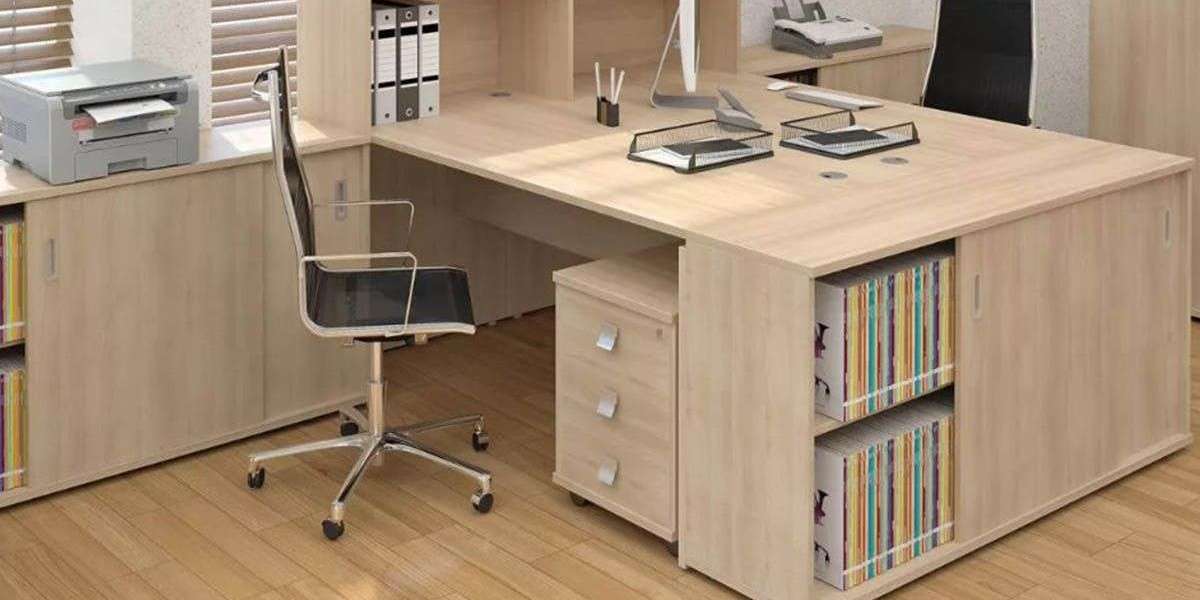Introduction
Corporate managers play a crucial role in shaping the company culture and influencing employee productivity. One of the most effective tools at their disposal is office furniture. Beyond its functional purpose, furniture can transform an office space into an inspiring environment that motivates teams, fosters collaboration, and enhances well-being. From ergonomic chairs to collaborative seating arrangements, thoughtful furniture choices can have a profound impact on team dynamics.
This blog provides practical office furniture ideas for corporate managers who want to create engaging, efficient, and motivating workspaces. These ideas are tailored to help managers boost morale, encourage teamwork, and drive productivity.
1. Collaborative Furniture to Foster Teamwork
Teamwork is the heart of most modern businesses, and office furniture can be a powerful enabler of collaboration. Designing collaborative spaces helps employees share ideas freely and work together more effectively.
Suggested Furniture for Collaboration:
Round Tables for Meetings: Encourage open discussion and remove hierarchy from meetings. Round tables are ideal for brainstorming sessions, as they make everyone feel included.
Modular Desks and Workstations: Desks that can be easily reconfigured are perfect for teams working on different projects. Employees can arrange them in clusters for collaborative work or as separate desks for focused tasks.
Soft Seating Areas for Informal Discussions: Sofas, bean bags, and lounge chairs provide a casual setting for brainstorming or quick team meetings.
Why It Matters:
Collaborative furniture makes teamwork natural and seamless, breaking down silos and encouraging innovation.
2. Ergonomic Office Furniture for Employee Well-Being
Long hours at work can take a toll on employees’ health. Managers need to ensure that ergonomic furniture is part of their office to prevent discomfort and improve productivity.
Recommended Ergonomic Furniture:
Adjustable Office Chairs: These chairs provide lumbar support, adjustable height, and armrests to fit employees' unique needs, preventing back and neck pain.
Sit-Stand Desks: Giving employees the option to alternate between sitting and standing helps improve posture and energy levels.
Ergonomic Desk Accessories: Use monitor stands, wrist pads, and footrests to prevent strain and encourage better posture.
Why It Matters:
Ergonomic office furniture shows employees that their health is a priority, which can improve job satisfaction and reduce absenteeism.
3. Modular Furniture for Flexibility and Growth
Business needs evolve, and offices must adapt quickly. Modular furniture offers flexibility, allowing managers to respond to changes such as team expansion or layout adjustments with ease.
Popular Modular Solutions:
Modular Desks: These desks can be arranged in different configurations, from open-plan setups to private workstations.
Mobile Storage Units: Pedestals and filing cabinets with wheels offer convenient storage and can be moved as needed to different areas of the office.
Sectional Seating: Modular sofas and chairs can be rearranged for meetings, relaxation, or informal collaborations.
Why It Matters:
Modular furniture ensures that the office can evolve with the company, keeping the workspace efficient and functional.
4. Furniture that Aligns with the Company’s Brand Identity
Office furniture should reflect the company’s values and brand identity. Managers can select furniture that aligns with the organization’s aesthetic, reinforcing company culture and creating a sense of pride among employees.
Ways to Align Furniture with Brand Identity:
Custom Upholstery: Use company colors for sofas, chairs, and partitions to reinforce branding.
Unique Furniture Pieces: Incorporate elements that reflect the company’s mission or industry (e.g., eco-friendly furniture for sustainability-focused companies).
Themed Spaces: Create rooms based on company values, such as innovation zones or collaboration hubs.
Why It Matters:
Brand-aligned furniture creates a cohesive environment, inspiring employees and making a strong impression on visitors and clients.
5. Breakout Spaces for Relaxation and Creativity
In addition to focused work areas, employees need breakout spaces to recharge. These areas help prevent burnout and foster creativity.
Essential Breakout Furniture:
Comfortable Lounge Chairs: Provide seating for employees to relax during breaks.
Coffee Tables and Ottomans: These pieces encourage casual conversations in between work sessions.
Activity Corners: Add game tables or recreational elements to encourage fun and relaxation.
Why It Matters:
Breakout spaces enhance employee well-being, reduce stress, and spark creativity.
6. Private Zones for Focused Work
Open-plan offices are great for collaboration, but employees also need private spaces to focus on tasks that require concentration. Managers can create quiet zones with the right furniture to balance privacy and openness.
Recommended Private Zone Furniture:
Acoustic Pods and Booths: These enclosed spaces allow employees to focus without distractions.
High-Back Sofas and Chairs: These pieces provide some visual and auditory privacy in open spaces.
Partitioned Desks: Desks with privacy screens give employees a personal workspace within a larger office.
Why It Matters:
Providing quiet areas ensures that employees can focus on complex tasks, improving overall productivity.
7. Greenery and Biophilic Furniture for Employee Well-Being
Incorporating plants and natural elements into office design enhances the environment and improves employees’ mood and productivity. Managers should look for furniture that integrates biophilic elements.
Biophilic Furniture Ideas:
Planter-Integrated Desks: Desks with built-in planters bring greenery closer to employees.
Living Walls: Vertical gardens create visual impact and improve air quality.
Natural Material Furniture: Use desks and tables made from wood or bamboo to connect with nature.
Why It Matters:
Biophilic design has been shown to reduce stress, improve creativity, and increase employee satisfaction.
8. Bold Colors to Boost Creativity
Office furniture in vibrant colors can stimulate creativity and energy. Managers can use bold hues strategically to differentiate spaces within the office and inspire employees.
Ways to Use Bold Colors:
Accent Chairs and Sofas: Add colorful chairs in meeting rooms or lounges to create visual interest.
Zonal Color Schemes: Use different colors to designate work zones, collaboration areas, and relaxation spaces.
Bright Desks and Storage Units: Vibrant furniture pieces can make workstations more engaging.
Why It Matters:
Colors influence mood and energy levels, helping to inspire creativity and focus in the workplace.
9. Smart Furniture for Modern Workplaces
Technology is transforming offices, and smart furniture ensures that workplaces remain efficient and future-ready. Managers should look for furniture that integrates technology seamlessly.
Smart Furniture Options:
Desks with Built-In Charging Ports: Keep devices charged without messy cables.
Smart Conference Tables: Tables with multimedia integration make meetings more productive.
Connected Chairs: Use sensors in chairs to promote healthy posture.
Why It Matters:
Smart furniture helps employees stay productive and connected, streamlining workflows.
10. Sustainable Furniture for Eco-Friendly Offices
Sustainability is becoming a core business value, and managers can support this by choosing eco-friendly office furniture.
Sustainable Furniture Options:
Recycled and Upcycled Furniture: Use desks and chairs made from recycled materials.
Bamboo and FSC-Certified Wood: These materials are sustainable and durable.
Low-VOC Finishes: Furniture with low chemical emissions improves indoor air quality.
Why It Matters:
Sustainable furniture aligns with environmental values, appealing to eco-conscious employees and clients.
Conclusion
The right office furniture helps managers inspire their teams, foster collaboration, and create a positive work environment. By focusing on ergonomics, flexibility, branding, and sustainability, managers can design workspaces that drive productivity and enhance employee well-being. Whether it’s modular desks, smart conference tables, or biophilic elements, each furniture choice contributes to creating a motivating and functional office.
Explore our collections today to find solutions that match your company’s vision and inspire your team to perform at their best.








